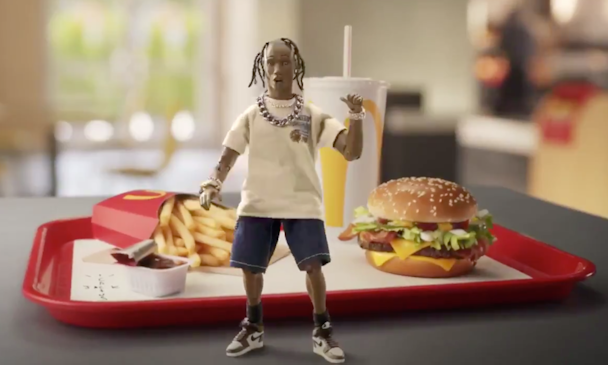Authenticity key for brands when collaborating with hip-hop artists
Hip-hop has made its mark on popular culture to inspire everything from fashion brands to social media trends. As a result, top brands have embraced hip-hop artists in their marketing to captilize on the artists’ creativity and fame – but it can have mixed results. The Drum explores the winners and the losers laying down the beats.

The Travis Scott meal at McDonald’s was introduced last year
In recent years rapper-brand collaborations such as McDonald’s Travis Scott meal, Just Eat’s jingle with Snoop Dogg and Reebok’s Cardi B collabs have been lucrative for both the corporation and the star. Hip-hop music has firmly cemented itself in the marketing mainstream.
The idea of hip-hop and brand partnerships can be extremely dynamic due to the bold nature of hip-hop itself. “Hip-hop is the voice of the culturally relevant. It’s the sound and expression of a movement, a personification of real issues and subjects, which have been translated into music rooted in jazz, blues and Motown,” says Elijah Torn, global executive creative director at MassiveMusic New York.
Aside from challenging society and bringing people together, there is a level of self-promotion rooted in hip-hop that brands are drawn to. “From calling out phony rappers to throwing up a bigger graffiti piece on the six train, hip-hop’s self-expression has historically been a first-person narrative. That perspective can range from positive affirmations to brash or even ostentatious and has often led to product placement within its lyrics,” adds Torn.
The most memorable ads are the ones that tell the story of the human experience – real stories about real people. This connects people the “same way hip-hop does: that’s why the two are a zeitgeist match made in heaven”. Brands view this as an endorsement opportunity to attract a younger audience and artists recognize they could capitalize off this by name-dropping them in their lyrics – it’s a winning combination.
Torn cites Mike Will Made it and Fanta; Tyler, the Creator and Coke; or A$AP Rocky in just about everything, from Fifa and Samsung to Adidas and Best Buy, as some of the stand-out spots of recent times.
Of course, like anything, once a product, song or piece of art enters the mainstream there will always be the notion that it loses some of its cool credentials. “Nowadays, hip-hop is mainstream. Pop culture has consistently tried to borrow and steal from it for almost forty years, without ever giving it proper credit,” Torn notes.
Brands are constantly trying to find new ways to reach younger audiences. Working with certain rappers makes hip-hop more accessible and commercial, and in turn organizations appear to be more alternative and cooler by default – if the campaign is done well.
With anything, there will always be misses, and “using a celebrity should never be at the cost of a poor creative idea,” advises Torn. Partnerships must feel authentic and hit the right notes tonally as well as visually. It boils down to education, and brands that are going to work with hip-hop stars in their marketing without doing their homework “lend themselves to ridicule”, with Torn highlighting Drake’s Sprite commercial and the MC Hammer and KFC deal as collaborations that fell off.
Music has always been a gateway to fashion and culture, and with hip-hop dominating the charts it can feel like a no-brainer for brands to work with megastar rappers. The most important question, however, brands need to ask themselves is, ‘How authentic are we being?’
Torn concludes: “Audiences will see straight through the obvious appropriation of culture for commercial means, rather than engaging with partnerships that feel real and meaningful.”

